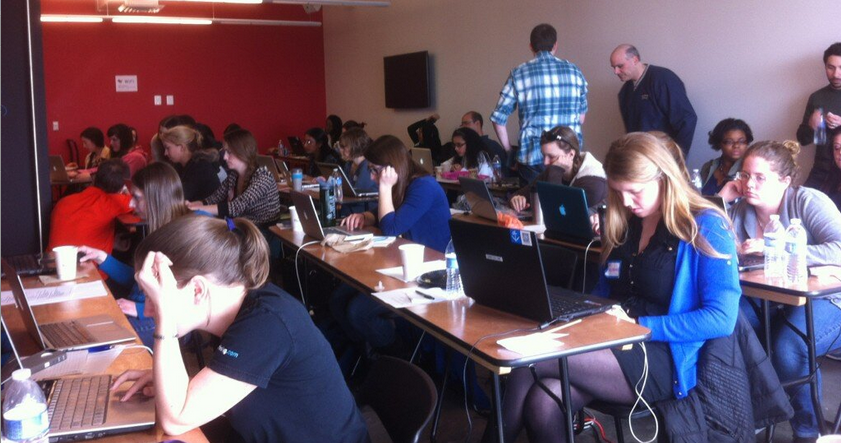Rails Girls, the popular event in more than 40 cities worldwide that serves as an introductory crash course in the programming language Ruby on Rails, hit Baltimore for the first time Saturday, when a crowd of 70 — mostly women — gathered at Betamore in Federal Hill for a day of coding. (It’s being hailed, unofficially, as the largest gathering of female coders in Baltimore city’s history.)
While most of the participants were from Baltimore, about a dozen traveled up from Washington, D.C., and a couple attendees were from New York City. Despite only starting to plan the event in January, the response organizers received was overwhelming, said Jess Gartner, a co-organizer and the director of education at Betamore.
“It sold out, with 95 percent women registration, in days and we had to add more tickets twice,” she said. “Finally we were just at capacity.” That didn’t stop 65 women, however, from signing up on a waiting list.
As fellow organizer Kate Bladow observed, “The popularity of this event speaks to the fact that there are women out there who want more technical training.”


For Gartner, though, helping to organize Rails Girls, a tech event marketed predominantly for women, raised a question of deeper significance: why even hold women-specific tech events?
“Whether anybody wants to believe it or not, there are these kind of inherent obstacles in the tech world that [make] people feel hesitant about attending [events],” Gartner said.
 The practicality of women-only tech events was the subject of a drawn-out debate on the Baltimore Tech Facebook group in January, primarily after an article Gartner had written—titled “Unpacking Male Tech Privilege”—was posted to the group’s wall. Gartner and supporters tried to make the argument that the tech world, and the events in particular, can be something of an Old Boys’ Club, where women feel excluded and uncomfortable. The late Aaron Swartz, in an interview in 2007, even identified misogyny in technology as a serious, “institutional problem.”
The practicality of women-only tech events was the subject of a drawn-out debate on the Baltimore Tech Facebook group in January, primarily after an article Gartner had written—titled “Unpacking Male Tech Privilege”—was posted to the group’s wall. Gartner and supporters tried to make the argument that the tech world, and the events in particular, can be something of an Old Boys’ Club, where women feel excluded and uncomfortable. The late Aaron Swartz, in an interview in 2007, even identified misogyny in technology as a serious, “institutional problem.”
Bladow said that part of the reason for holding a women-specific event was to “think about what keeps women from going to those other events.” Some women, she said, might be unable to find someone to babysit their children for a few hours on a weeknight, just one reason why women might self-select out of tech events.
Not everyone, however, is convinced of the need for women-only tech events, as the Facebook debate showed. Michael Rosner, the familiar photographer of many tech events in Baltimore city, made the case that women-only events were unnecessary—that all women had to do was attend the events already being held.
To a degree, Rosner’s argument holds water: for better representation of women at tech events, women need to attend tech events. But it’s too simplistic to assume the reason why women aren’t attending tech events is because they’re uninterested or willingly refraining from going, a dubious conclusion at best.
Moreover, that’s part of the reason to hold such an event as Rails Girls, for which 75 women registered before five dropped out the day of the event.
“When you market something that’s directly for a normally marginalized group, they feel comfortable about attending,” Gartner said.
As she mentioned following the event’s end Saturday evening, the women there were beginning programmers, but also data scientists, web developers and cybersecurity experts.
“But, for some reason,” she added, “they’re not in the communication channel that is used in online marketing for the Baltimore tech events.”
If nothing else, Gartner’s insight highlights a persistent problem members of Baltimore’s tech community routinely cite, irrespective of any real or perceived gender imbalance: the uncanny ability Baltimoreans have to wall themselves off in isolated, cliquish groups.
Rails Girls event called ‘largest gathering of female coders’ in Baltimore city’s history







